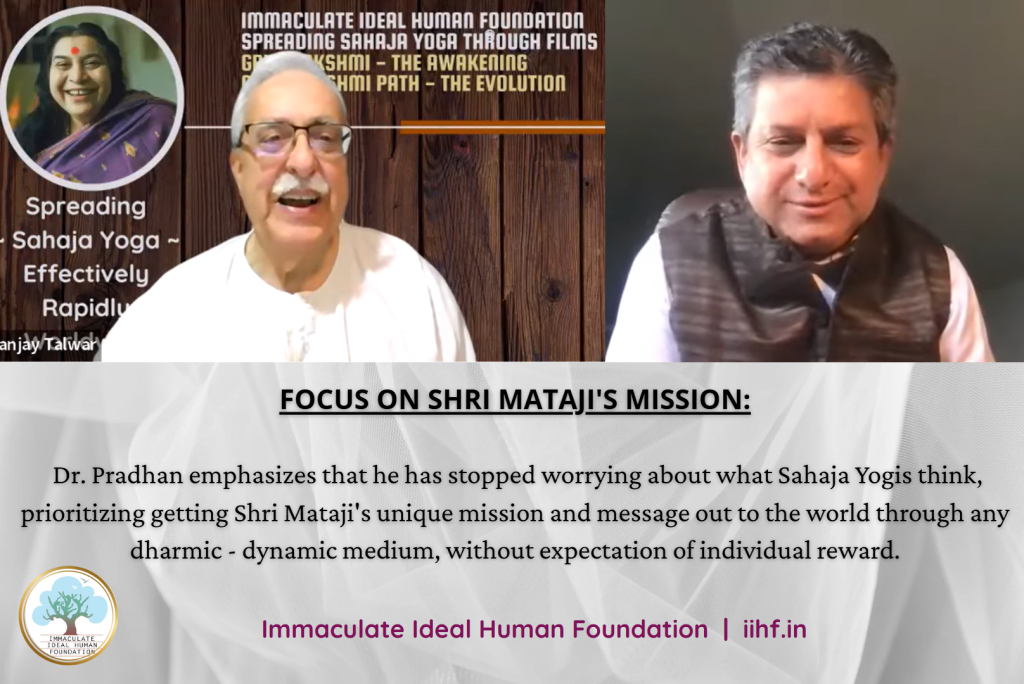Informal Chat with Dr. Ashish Pradhan: The conversation is an informal chat and recollection with Dr. Ashish Pradhan.
- Decades of Connection: The speakers are getting together after decades.
- Dr. Ashish Pradhan’s Medical Background: Dr. Ashish Pradhan is a medical doctor; he specialized in internal medicine and has worked in cardiology and neurosciences, with a current focus on neuroimmunology (interaction of the human nervous system with the human immune system).
- Family Connection to Sahaja Yoga: Dr. Pradhan’s family (specifically his father, Pradhan Sahab) knew Shri Mataji Nirmala Devi (Shri Mataji) from the early to mid-1980s in Bombay.
- Assistance for Musicians: Dr. Pradhan’s family helped musicians who traveled with Shri Mataji for public programs in Bombay.
- Program “Jewels of Sahaja Yoga”: This program highlights individuals who are “shining on their own because of Shri Mataji Nirmala Devi” and spreading her light through their work.
- Dr. Pradhan’s Contribution: Dr. Pradhan is acknowledged as a medical professional who translates his work to help people understand both the medical and subtle aspects of Sahaja Yoga.
- Praise for Dr. Pradhan’s Series: The speaker (Sanjay) has heard Dr. Pradhan’s three episodes and is very impressed.
- Early Days in Sahaja Yoga: Dr. Pradhan’s father took to Sahaja Yoga in the mid-to-late 1970s.
- Introduction to Sahaja Yoga: The Sharwanti Shykari family introduced Dr. Pradhan’s family to Sahaja Yoga.
- Shri Mataji’s Relatability: Shri Mataji was described as a “wondrous person,” “very attractive,” and “very relatable,” and not some remote mahaguru – sitting on a throne and distant!
- Special Consideration for Children: Shri Mataji gave special consideration and love to children, caring about their well-being beyond academic performance, admiring them for who they were.
- Establishment of Yuva Shakti: Shri Mataji established the Yuva Shakti in 1987, and Dr. Pradhan was part of the founding cadre.
- Shri Mataji’s Leadership Style: Shri Mataji trusted young people (like 17-year-olds) with responsibilities for arranging public programs and pujas.
- Dr. Pradhan’s Marriage: Shri Mataji arranged Dr. Pradhan’s marriage in 1993.
- Sanjay’s Role in Dr. Pradhan’s Travel: Sanjay (the speaker) helped Dr. Pradhan purchase his ticket to travel with Shri Mataji to Italy in 1994, acting as her travel agent.
- Dr. Pradhan’s Journey Abroad: After his MD, Dr. Pradhan spent 2.5 years with Shri Mataji in Cabella, Italy, then moved to Canada for a fellowship in 1997, and later worked in the pharmaceutical industry in the UK and US (focusing on neuroimmunology for the past 15-20 years).
- Fond Memories of Senior Pradhan Sahab: Sanjay has fond memories and videos of Dr. Pradhan’s father praising his music in front of Shri Mataji.
- Sanjay’s Role as Musician and Travel Agent: Shri Mataji made Sanjay a musician and a travel agent, responsible for booking her tickets and making arrangements for Sahaja Yogis traveling to and from India.
- Shri Mataji’s One-on-One Relatability: Shri Mataji was easy to talk to and very relatable.
- An Anecdote of Shri Mataji’s Care (The Teapot Incident): Shri Mataji wrapped her sari pallu around a scalding hot teapot handle to prevent Dr. Pradhan from burning his fingers, demonstrating her nurturing and protective nature.
- Shri Mataji’s Everyday Divinity: Shri Mataji’s divinity was reflected in her everyday actions as an Indian housewife, mother, grandmother, and wife, balancing her own family and the larger Sahaja Yogi family.
- Interaction with All People: Shri Mataji interacted with VIPs and villagers with the same respect and approach, adjusting her language to suit the audience.
- Patriotism vs. Jingoism: Shri Mataji strongly disliked Indians criticizing India or Indianness. She accepted flaws in Indian society but actively worked to rectify them. She taught patriotism as working within the system to improve it, not as jingoism or blindly criticizing.
- Appreciation vs. Criticism: Shri Mataji emphasized appreciation over criticism, stating that appreciation fosters compassion and understanding, while criticism closes the heart and pulls others down.
- Sanjay’s Experience with Criticism: Sanjay faced significant criticism for his music and movie-making (e.g., “Mahalakshmi Path” receiving over 114 awards despite opposition). Shri Mataji advised him to forgive critics, have compassion, patience, and forbearance, and always use vibrations.
- Evolution of Music in Sahaja Yoga: In the early days (1970s-80s), music in Sahaja Yoga was often confined to professional artists who were paid. The “Nirmal Sangeet Sarita” (introduced by Baba Mama and formalized by Shri Mataji) changed this, encouraging Sahaja Yogis to perform.
- Shri Mataji’s Perspective on Music: Shri Mataji never critiqued musical performances technically. Instead, she focused on how the artist was enjoying his or her own artistry and the enjoyment of the creator in the creative act, seeing it as a metaphor for creation itself. This applies to filmmaking as well – the enjoyment of the creator is paramount.
- Enjoyment in Creation: Shri Mataji focused on whether the creator (artist/filmmaker) was enjoying their own creation, seeing it from the “lens of the Atma” (the divine self), not from a critical or worldly perspective. This enjoyment, not external validation, is what truly matters.
- Criticism as a Barrier: The difficulty Sahaja Yogis face in understanding Shri Mataji’s perspective often stems from an immediate tendency to criticize anything “different,” questioning if “Mother said this.”
- Self-Realization and Creativity: Shri Mataji encouraged Sahaja Yogis to realize their own creativity and enjoyed the artistry in any field—music, fine arts, performing arts, academia, or research—as long as it adhered to Sahaja Yoga principles and dharma.
- Blessed Medical Thesis: The medical thesis by Dr. U.C. Rai’s students (including Deepak) at Lady Harding Medical College, focusing on hypertension and bronchial asthma, was frequently mentioned by Shri Mataji and is considered “probably the most blessed medical thesis in human history.”
- Focus on Shri Mataji’s Mission: Dr. Pradhan emphasizes that he has stopped worrying about what Sahaja Yogis think, prioritizing getting Shri Mataji’s unique mission and message out to the world through any dharmic medium, without expectation of individual reward.
- Praise for Dr. Pradhan’s Podcasts: Sanjay highly praises Dr. Pradhan’s podcasts for their articulate and accessible presentation of medical aspects, combined with divine knowledge and experience.
- Shri Mataji’s Dream and Request (to Sanjay): A very senior Sahaja Yogi had a dream two months prior, where Shri Mataji expressed happiness with Sanjay’s film “Mahalakshmi Path” (which won the 108th award, “Bharat Gaurav,” for women empowerment) and explicitly asked him to make a film/web series on her life, Sahaja Yoga, its medical aspects, and miracles. She promised her help in this endeavor.
- “Transformation” Series Idea: Sanjay is assembling a team to work on this series, provisionally titled “Transformation,” aiming to cover Shri Mataji’s life, the advent of Sahaja Yoga, and incorporate the medical and subtle body aspects (chakras, organs, plexuses, deities, and personality changes during Kundalini awakening).
- Invitation to Dr. Pradhan: Sanjay invites Dr. Pradhan to join the advisory board for this series to help integrate the medical aspect.
- Shri Mataji’s Current Mode of Action: Dr. Pradhan believes Shri Mataji is now “acting through a different medium” and that her guidance is a felt experience, not just a thought process.
- Societal Change and Distractions: Society has changed significantly since the 1970s. The “menace” of fake gurus has been replaced by the “epidemic” of social media, which acts as a major distraction, taking attention away from God (Shri Mataji’s definition of negativity).
- Navigating Challenging Times: The series should address how human society has been transformed by technology and social media, and how Sahaja Yoga can help people navigate these challenging times, especially with the intense competition for attention.
- Updating Sahaja Yoga’s Messaging: Dr. Pradhan notes that Sahaja Yoga’s messaging is still “stuck in the 70s and 80s” and needs to be updated for modern times and to reach the younger generation who are familiar with contemporary language, idioms, and metaphors.
- Shri Mataji’s Genius in Metaphor: Shri Mataji’s genius lay in translating ancient teachings into 20th-century metaphors (e.g., mic not connected to mains). The new series needs to find current metaphors for the younger generation.
- Call for Collective Effort: Sanjay and Dr. Pradhan express a desire to work together to bring Shri Mataji’s vision forward in these changing times.
- Gratitude and Future Session: Sanjay expresses gratitude for Dr. Pradhan’s wisdom and experiences and plans for a second session to continue the conversation.
- Open to Collaboration: Dr. Pradhan accepts the invitation to join the advisory panel and emphasizes his willingness to help with anything for Shri Mataji, offering to involve other talented Sahaja Yogis from the US.
This conversation highlights the enduring relevance of Shri Mataji’s teachings, the challenges of spreading Sahaja Yoga in a rapidly changing world, and the dedication of her followers to adapt her message for new generations while preserving its essence.

